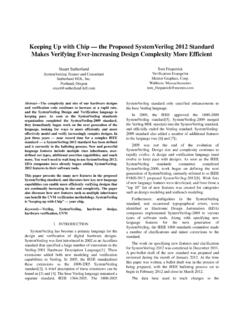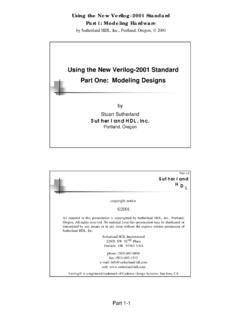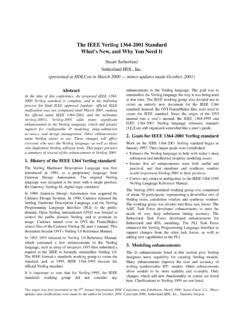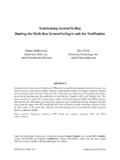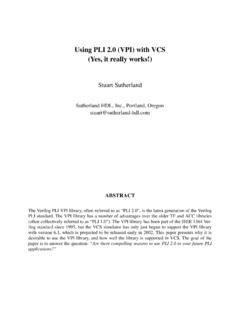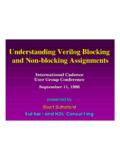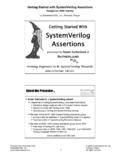Transcription of Standard Gotchas: Subleties in the Verilog and ...
1 Standard GotchasSubtleties in the Verilog and systemverilog standards that every engineer Should Know!Don MillsMicrochipChandler, SutherlandSutherland HDL, , 20 LLHHDDSS uutthheerrllaannddtraining engineersto be systemverilog WizardsDon Mills,Don Mills,MicrochipMicrochipStu SutherlandStu SutherlandPresentation Overview What is a gotcha ? Why do standards have gotchas? What s covered in this paper Several example gotchas, and how to avoid them! Summary3of 20 LLHHDDSS uutthheerrllaannddtraining engineersto be systemverilog WizardsDon Mills,Don Mills,MicrochipMicrochipStu SutherlandStu SutherlandWhat Is A gotcha ?
2 In programming, a gotcha is a legal language construct that does not do what the designer expectsA Classic C programming (day =15)/* process payroll */If middle of the month, then pay middle of the month, then pay ! This code will assign the value of 15 to day, and then if day is not zero, pay the employeesGOTCHA!This code will assign the value of 15 to day, and then if day is not zero, pay the employeesEngineers need to know how to recognize and avoid gotchas in hardware modeling! gotcha ! gotcha ! In hardware design and verification, most gotchas will simulate,but give undesired results Gotchas can be difficult to find and debug A gotcha can be disastrous if not found before tape-out!
3 4of 20 LLHHDDSS uutthheerrllaannddtraining engineersto be systemverilog WizardsDon Mills,Don Mills,MicrochipMicrochipStu SutherlandStu SutherlandWhy Do standards Have Gotchas? standards developers are idiots Users of standards are idiotsif (day=15)/* process payroll */while (data=fscanf(..))/* read in data until it is 0 */A dumb way to use assignment within an expression A dumb way to use assignment within an expression A clever way to use assignment within an expression A clever way to use assignment within an expression Languages can be used the right way,or the wrong wayGotcha!
4 gotcha ! Verilog and systemverilog allow designers to prove what will and what will not work correctly It needs to be legal syntax to model bad hardware Hardware models are not just simulated, they are synthesized, analyzed, emulated, prototyped, formally proved, .. Each type of tool needs different information from the language5of 20 LLHHDDSS uutthheerrllaannddtraining engineersto be systemverilog WizardsDon Mills,Don Mills,MicrochipMicrochipStu SutherlandStu SutherlandIs This a Verilog gotcha ? Is the classic C gotcha also a gotcha in Verilog ?
5 Always @(state)if (state=LOAD)..Legal or Illegal?Illegal! Verilog does not allow assignment statements inside of expressionsIf you don t know the answer, then you really need to read this paper!(We will answer this question at the end of our )always @(state)if (state=LOAD)..Legal or Illegal? What about in systemverilog ? systemverilog extends Verilog with more C and C++ features6of 20 LLHHDDSS uutthheerrllaannddtraining engineersto be systemverilog WizardsDon Mills,Don Mills,MicrochipMicrochipStu SutherlandStu SutherlandWhat s In This Detailed descriptions of 57 how to avoid them!
6 Case sensitivity Implicit net declarations Escaped identifiers in hierarchy paths Verification of dynamic data Variables declared in unnamed blocks Hierarchical references to package items Variables not dumped to VCD files Shared variables in modules Shared variables in interfaces, packages Shared variables in tasks and functions Importing enum types from packages Importing from multiple packages Resetting 2-state models Locked state machines Hidden design problems Out-of-bounds indication lost Signed versus unsigned literal integers Default base of literal integers Size mismatch in literal integers Literal size mismatch in assignments Z extension backward compatibility Filling vectors Passing real types through ports Port connection rules
7 Back-driven input ports Self- & context-determined operations Operation size and sign extension Signed math operations Bit and part select operations Increment and decrement operations Pre-increment versus post-increment Multiple read/writes in one statement Operator evaluation short circuiting Assignments in expressions Procedural block activation Combinational logic sensitivity lists Arrays in sensitivity lists Vectors in sensitivity lists Operations in sensitivity lists Sequential blocks with Sequential blocks with partial reset Blocking assigns in sequential blocks Evaluation of true/false on 4-state values Not operator versus invert operator Nested blocks Casez/casex masks in case expressions Incomplete or redundant decisions Out-of-bounds in enumerated types Statements that hide design problems Simulation versus synthesis mismatches Multiple levels of same virtual method Event trigger race conditions Using
8 Semaphores for synchronization Using mailboxes for synchronization Coverage reporting $unit declarations Compiling $unit7of 20 LLHHDDSS uutthheerrllaannddtraining engineersto be systemverilog WizardsDon Mills,Don Mills,MicrochipMicrochipStu SutherlandStu SutherlandA Classic Verilog gotcha : Implicit Net Declarations An undeclared signal used in a netlist infers an implicit net Implicit nets can save typing hundreds of lines of code in a large, gate-level design An undeclared vector connection infers a 1-bit wire, not a vector; A typographical error in a netlist becomes a functional bugxor u1 (n0, a, b);and u2 (n1, nO, c);ram u3 (addr, data, nl).
9 Netsn0 en-zero andnO en-oh are inferred, but are not connected together Netsn0 en-zero andnO en-oh are inferred, but are not connected together Verilog s default_nettype noneturns off implicit net types systemverilog .nameand .*port connections will not infer netsGotcha! gotcha ! Netsn1 en-one andnl en-ell are inferred, but are not connected together Netsaddranddataare inferred as 1-bit wires, but should probably be vectors To avoid this 20 LLHHDDSS uutthheerrllaannddtraining engineersto be systemverilog WizardsDon Mills,Don Mills,MicrochipMicrochipStu SutherlandStu SutherlandGotcha: Default Base of Literal Numbers is Decimal Optionally, literal numbers can be defined with a base default base is decimal hC // unsized hex value2 b01 // sized binary valuereg [1:0] state.
10 Always @(state)case (state)00:// do State 0 stuff01:// do State 1 stuff10:// do State 2 stuff11:// do State 3 stuffendcaseHint: There are 10 types of people in the those that know binary, and those that don t!Hint: There are 10 types of people in the those that know binary, and those that don t!Why don t states 2 and 3ever execute? To avoid this Use unique caseto detect the error Use based numbers to fix the problem ( b10) gotcha ! gotcha !9of 20 LLHHDDSS uutthheerrllaannddtraining engineersto be systemverilog WizardsDon Mills,Don Mills,MicrochipMicrochipStu SutherlandStu SutherlandGotcha: Literal Numbers Are Zero-extended to Their Size Literal number syntax is.

